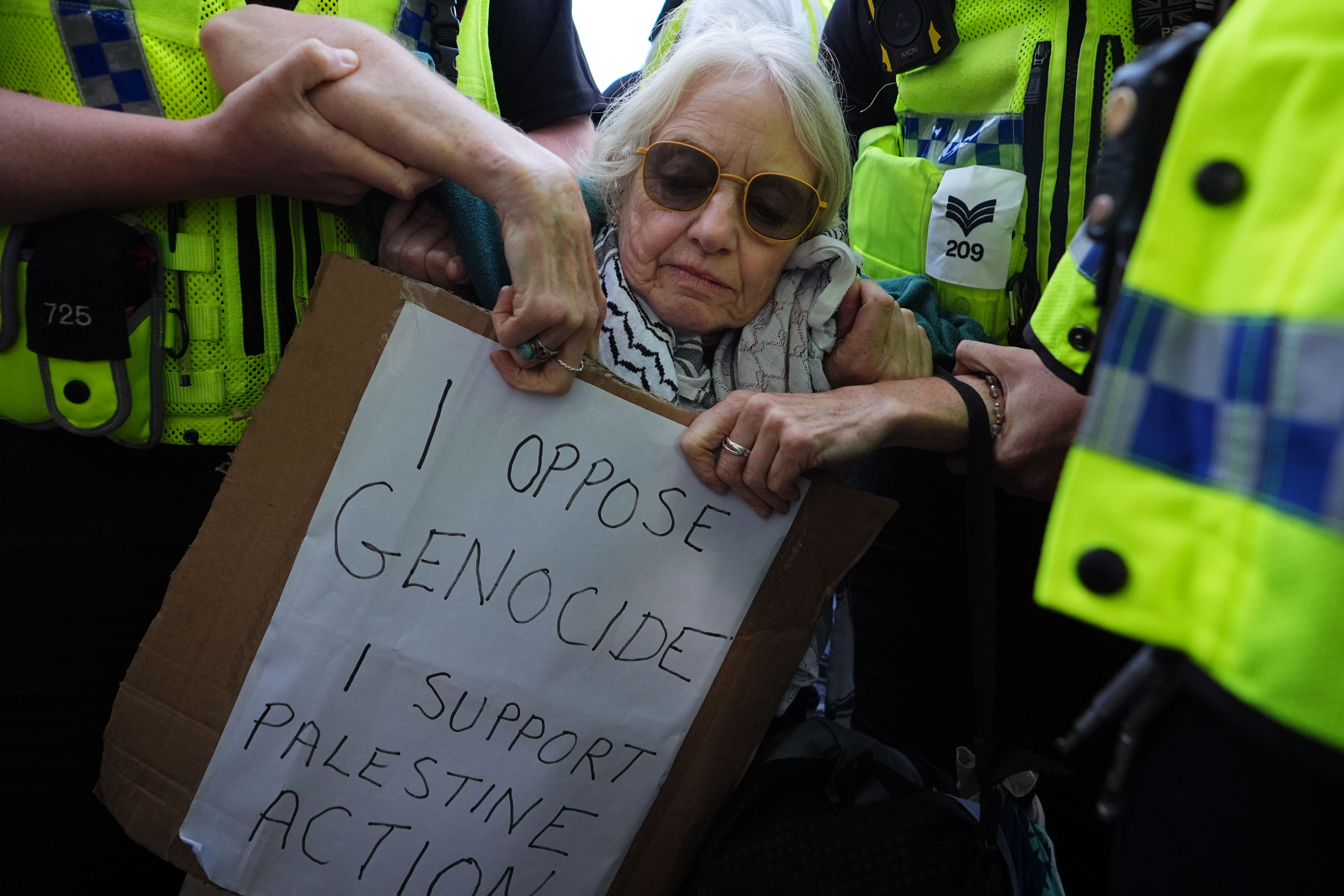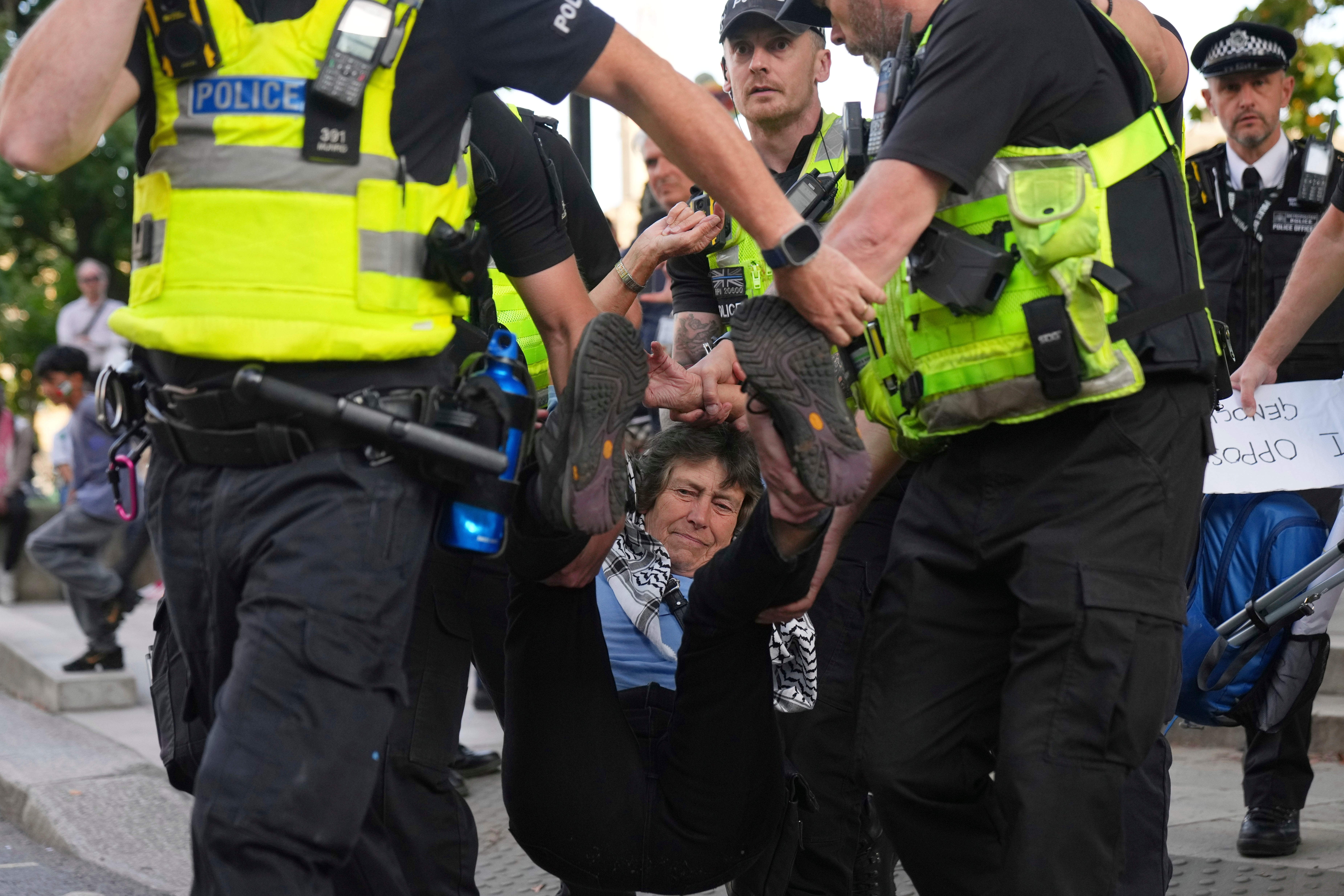The number of people charged with supporting Palestine Action has reached unprecedented levels in just two months, quadrupling levels seen in the two decades since 9/11.
At least 138 people have been charged under Section 13 of the Terrorism Act – which bans displaying or publishing a sign, flag or clothing in support of a terrorist organisation – since Palestine Action was proscribed as a terrorist group in July, according to provisional figures from the Crown Prosecution Service.
By comparison, just 34 people have been charged under the same offence between 2001 and the end of June 2025 – days before Palestine Action was added to the government’s list of designated terrorist organisations.
Shami Chakrabarti called the scale of the Palestine Action charges “unprecedented”, while other members of the House of Lords questioned whether this use of police resources, which has seen scores of officers deployed to patrol rallies in support of the group, was “counterproductive”.

The number of people charged over recent protests is likely to grow – with hundreds of people arrested for supporting Palestine Action so far, including 857 at one protest on Saturday alone.
“This absurd misuse of terrorism legislation is deeply damaging to our freedom of speech,” warned Lord Paul Strasburger, a Liberal Democrat life peer, in the House of Lords on Tuesday.
Already, the number of terrorism charges since the group was banned after protesters broke into an RAF base and damaged two military aircraft earlier this year has exceeded any given year, when comparing to the latest Home Office figures. This remains the case even when including more serious offences such as directing or fundraising for a terrorist group, or weapons training.
Charges under Section 13 (of the Terrorism Act 2000) specifically relate to “displaying or publishing articles or images in support of a proscribed organisation”.
That could include wearing items of clothing, such as a keffiyeh, which has become synonymous with Palestine solidarity, or carrying items which “arouse reasonable suspicion” of support for Palestine Action, such as a sign or flag.
There have never been more than 10 charges for this offence in a single year before this year.
The consequences of being charged include spending up to six months in prison, a potential bar to countries such as the US and Australia, and a permanent criminal record, which will likely affect opportunities for employment or university.
Ministers have warned that the lines are blurred for those attending demonstrations, who may have numerous motivations, such as protesting the actions of Israeli forces or the terrorism proscription itself.
“The lines are too blurred between protesting for Palestinian lives, support for de-proscription and support for Palestine Action [itself],” Ms Chakrabarti told The Independent.
Home Office minister David Hanson, meanwhile, has argued that “it is for the police at a local level to interpret the legislation”, saying that the arrests were at their discretion.
“If people wish to protest in support of Palestine, they can do so. They can march, protest, criticise Israel and make their views known on Palestine, but Palestine Action has crossed that threshold,” he added.

But former police commissioner Bernard Hogan-Howe warned that the burden of this distinction should be put on the government, not the police – who are dealing with the “consequences” of the proscription.
“Surely we should all be supporting the police because, after all, this is a logical consequence of prohibiting the group and having a law to make sure that support for terrorism is illegal,” Lord Hogan-Howe told the House of Lords in a debate on Tuesday.
He added: “The government must have considered that this group had some mass support for its general intent, if not its methods. This is one of the consequences that the police will have to try to resolve, and we all need to support them until this matter is resolved politically.”
Ms Chakrabarti notes that the thousands of people attending protests in recent weeks will also struggle to express where they fall on the spectrum of support for Palestine Action when facing arrest, adding: “It’s unreasonable to expect the police or public to conduct legal seminars on the ground.”
She also warned that the lack of clarity around Palestine Action’s proscription is damaging trust in government, and urged greater transparency.
“If the government has evidence of Palestine Action plotting to take lives rather than damage property, they should publish it as soon as possible to avoid even greater damage to public trust,” said Ms Chakrabarti.

Home Office secretary Lord Hanson confirmed that there are currently “no plans” to review the legislation, although the government has de-proscribed terror groups in the past.
“Proscription decisions should be constantly reviewed, not least in relation to changing circumstances – including unprecedented numbers of arrests for vague support rather than membership,” Ms Chakrabarti told The Independent.
“Will the government please stop shooting the messengers in Parliament Square and start listening to their message, which is that Britain is doing nowhere near enough to stop the daily atrocities in Gaza?” urged Lord Strasburger this week.







